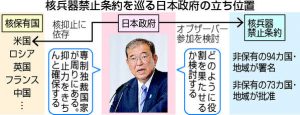Nihon Hidankyo awarded Nobel Peace Prize: Paying no heed to desires of hibakusha, Japan’s government deepens reliance on nuclear deterrence
Dec. 12, 2024
Government will “consider” joining TPNW, but its commitment is called into question
by Koji Higuchi and Fumiyasu Miyano, Staff Writers
With the Japan Confederation of A- and H-Bomb Sufferers Organizations (Nihon Hidankyo) being awarded the Nobel Peace Prize, the actions of the government of the A-bombed nation of Japan have come into focus. While indicating it would consider participating as an observer in the meeting of States Parties to the Treaty on the Prohibition of Nuclear Weapons (TPNW), as called for by Nihon Hidankyo, the Ishiba administration is deepening its reliance on U.S. nuclear deterrence, citing the tense security environment. Amid questions about the government’s commitment to consideration of the issue, concrete action on its part toward nuclear abolition is not in evidence.
Chief Cabinet Secretary Yoshimasa Hayashi stated at a press conference on the morning of December 11, “There is no change in our view that deterrence, including nuclear deterrence, is the foundation for ensuring Japan’s security.” That contradicted the wishes of A-bomb survivors (hibakusha), as expressed a half day earlier by Terumi Tanaka, 92, co-chair of Nihon Hidankyo, in his Peace Prize acceptance speech, in which he emphasized, “Rather than nuclear deterrence, we believe the possession of even a single nuclear weapon must not be allowed.” Mr. Hayashi’s statement made it clear that the government’s traditional approach remains unchanged.
Different from the Abe, Suga, or Kishida administrations of recent years, Prime Minister Shigeru Ishiba is exploring participation in the TPNW as an observer. He told reporters during the Liberal Democratic Party (LDP) leadership election in September that observer participation was “one option.” Even at a Lower House Budget Committee meeting on December 10, the prime minister hinted that the government “would consider what kind of role it could play.”
However, whenever political leaders make such statements, they also tend to explain the importance of nuclear deterrence, citing “the most serious and complex security environment in the post-war period,” including North Korea’s nuclear and ballistic missile programs. The Constitutional Democratic Party of Japan’s Shinji Morimoto, an Upper House member representing Hiroshima, who called on the prime minister for observer participation in a December 6 Upper House Budget Committee meeting, later stated frankly, “I could not get a sense of the prime minister’s commitment to this issue.”
There is a persistent view in both the ruling and opposition parties that Japan’s Foreign Ministry, which places importance on its relationship with the United States, a country that holds a negative view of the TPNW, is putting the brakes on consideration of observer participation in the treaty. Komeito party leader Tetsuo Saito went so far as to say, “I will persuade the Foreign Ministry.” In fact, senior officials at the ministry have revealed that its stance on the treaty “has not changed.” It is adhering to the approach of the previous Kishida administration, which distanced Japan from the treaty based on the non-participation of nuclear weapons states.
On December 10, Japan and the United States began talks in Japan on the issue of “extended deterrence.” The meeting’s theme was the matter of how to enhance Japan’s defense capabilities, backed by the military power of the United States, including that nation’s nuclear capabilities. Opposition party leaders criticized the fact that the talks began on the same day the Nobel Peace Prize award ceremony was held, calling it “symbolic of the government’s stance that it has no intention whatsoever of breaking away from nuclear deterrence.”
Regarding national compensation for victims of the atomic bombings, a subject that Nihon Hidankyo Co-chair Mr. Tanaka repeated in his Peace Prize acceptance speech, Mr. Hayashi stated simply on December 11 that “the national government does not provide any benefits just as with ordinary people who died in the war.”
The government prides itself on its commitment to “leading the international community’s efforts toward abolishing nuclear weapons in its mission as the only nation to have suffered atomic bombing in war.” In reality, however, Japan continues to turn its back on the desires of A-bomb survivors to break away from nuclear deterrence and have the national government provide compensation to victims of the atomic bombings. Will the government refuse to change its stance even after Nihon Hidankyo was awarded the Nobel Peace Prize? Hibakusha continue to suffer.
(Originally published on December 12, 2024)








